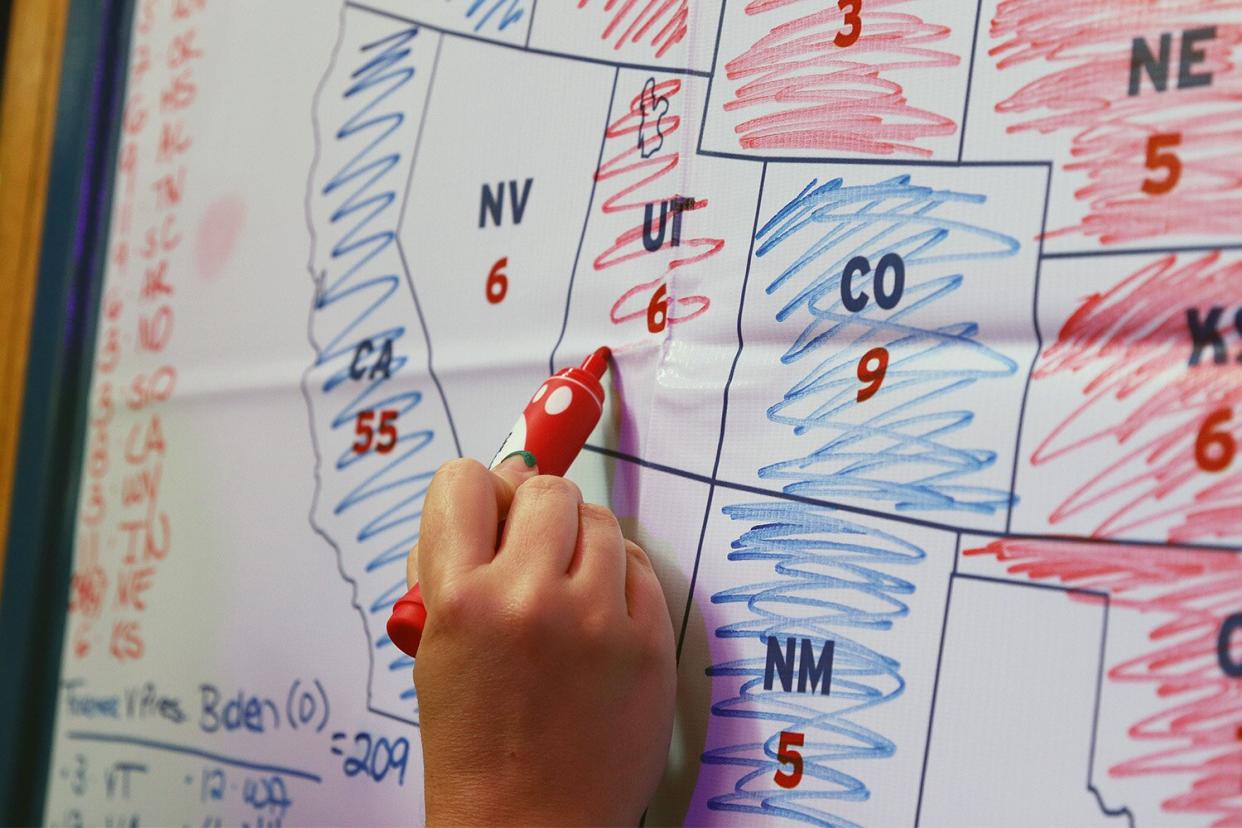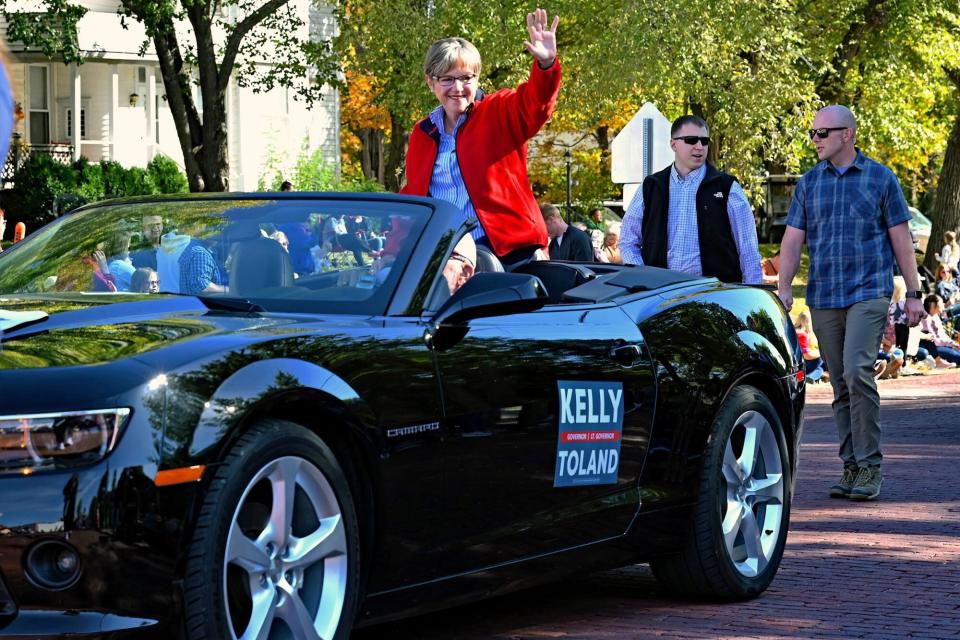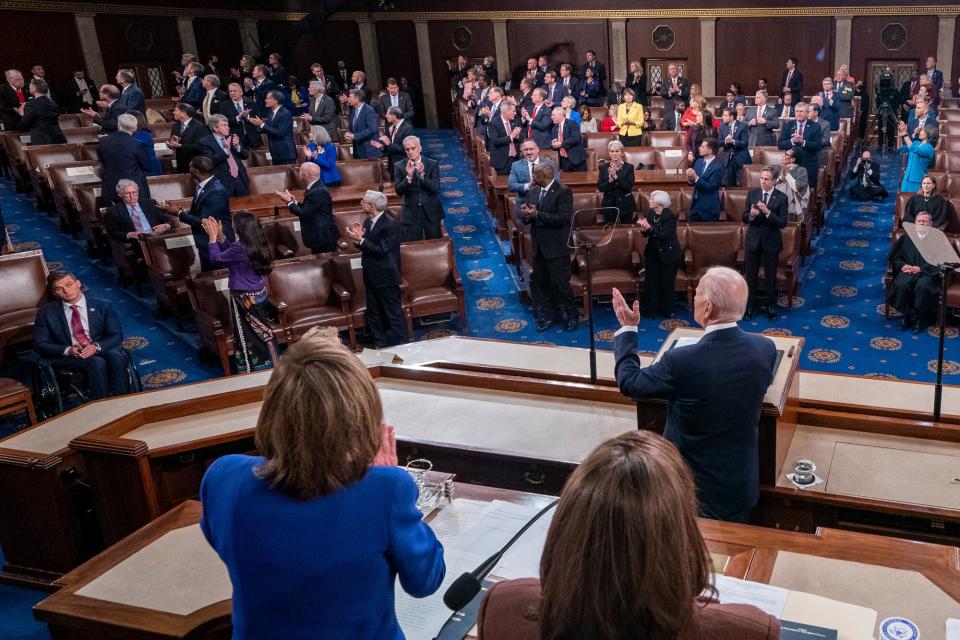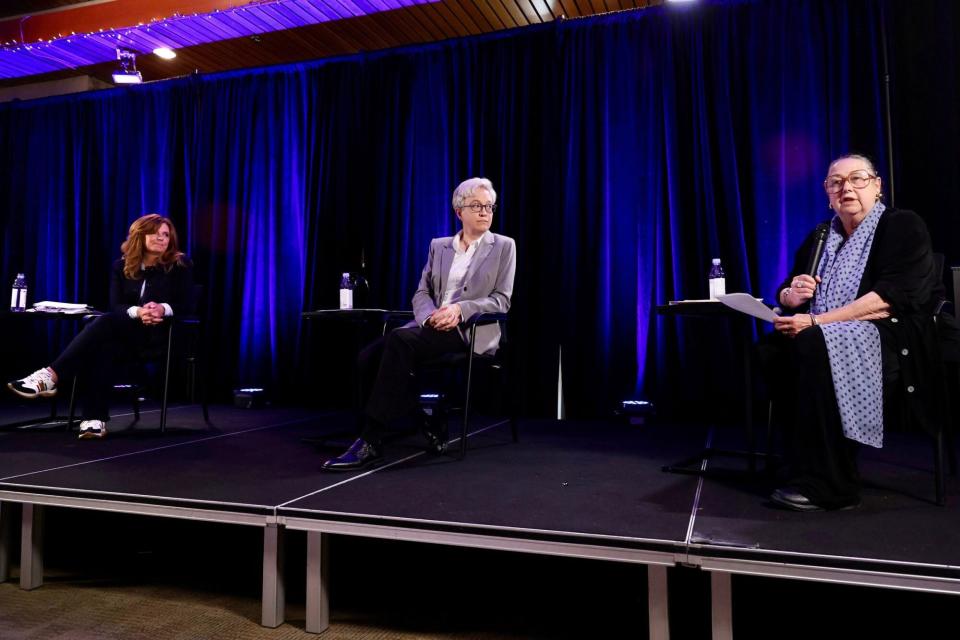Why 'Red State' and 'Blue State' Labels Don't Always Apply to Governor Races

- Oops!Something went wrong.Please try again later.
- Oops!Something went wrong.Please try again later.
Lynn Grieveson/Newsroom/Getty
If you look up any Electoral College map from recent presidential elections, you can expect that states like Kansas, Kentucky and North Carolina will be red, and states like Maryland, Massachusetts and Virginia are blue. It may come as a surprise, though, that each of those states have sitting governors from the minority party.
In the upcoming midterm elections, a couple of new states show possibility of electing underdog gubernatorial candidates: firmly Democratic Oregon, which last elected a Republican governor in 1982, and firmly Republican Oklahoma, which last elected a Democratic governor in 2006.
History shows that even voters in heavily Republican or Democratic states are more likely to break away from their party when voting in statewide elections, even if they're set on voting along party lines in federal races. Historical trends alone don't offer an explanation though, which is why PEOPLE picked the brains of three voting pattern experts who have seen the phenomenon unfold on their own home turf.
Here are the prime reasons that underdog gubernatorial candidates are sometimes able to succeed in our deeply polarized world, according to political science professors who specialize in U.S. elections.
RELATED: 2022 Midterms: Every Senate, House and State Race Americans Should Follow
Governor races involve local issues
In presidential elections, candidates must split their campaign priorities between domestic and foreign affairs, often taking broad stances on issues to appeal to the masses. In gubernatorial elections, candidates have the ability to go deeper, honing platforms around the specific concerns in their respective regions. Some states may be laser-focused on addressing crime rates, others on quality of education; some may have been hit particularly hard by rising prices, whereas others are more distraught by the recent attacks on reproductive rights.
"Even though all elections have been nationalized to some extent, races for state offices, including the governor, still have heavy local elements," says Dr. Don Haider-Markel, a political science professor at the University of Kansas who specializes in American politics and public opinion.

Mark Reinstein/Shutterstock
Haider-Markel explains that in 2018, when Democrat Laura Kelly was elected as Kansas' governor, she campaigned on restoring funding for schools that had been hurt by Republican Gov. Sam Brownback's failed tax cut experiment. It worked.
"Governors appeal to a different constituency than presidential candidates," echoes Dr. Neil O'Brian, an assistant professor at the University of Oregon whose research has focused on political parties and polarization. "State campaigns can use local issues or modify national messaging to suit their state."
An unpopular incumbent taints the race
Whether incumbent governors are on their way out or running for reelection, they have a lot of influence on how voters swing in statewide races.
Right now in Oregon — which has voted blue in every presidential election since 1988 and has not elected a Republican governor in 40 years — Democratic gubernatorial nominee Tina Kotek is in a dead heat with her Republican challenger. O'Brian says Kotek's challenges in commanding a lead are in part because outgoing Democratic Gov. Kate Brown is one of the least popular governors in America right now, due to her COVID-19 response and Oregon's homelessness problem.
"This then is causing people to shy away from Kotek, the liberal Democratic candidate who is seen as an ally of Brown's," adds O'Brian. Despite saying she disagrees with Gov. Brown's response to issues like homelessness, Kotek has struggled to convince Oregon Democrats that she's the solution to a member of their own party's problem.
Never miss a story — sign up for PEOPLE's free daily newsletter to stay up-to-date on the best of what PEOPLE has to offer.
In Oklahoma this year, Democratic gubernatorial candidate Joy Hofmeister has benefited from running against an incumbent with relatively unpopular views. Sitting Republican Gov. Kevin Stitt has taken a hard stance against abortion access and adopted other extreme viewpoints that a large share of Republicans disagree with, leading Hofmeister to swoop in and portray herself as the antidote, earning a surprising amount of support for a state so red.
"Hofmeister is hoping that she can unite centrist Republicans and Democrats against what many perceive to be a far-right incumbent," explains Dr. Matt Lindman, professor and chairman of political science at the University of Tulsa. "Even if Oklahoma is extremely unlikely to vote for a Democratic candidate for president or U.S. Senate anytime soon, the governor's race may be different."

Shawn Thew - Pool/Getty
Washington, D.C. approval ratings trickle down
The popularity of federal politicians also directly impacts their party's reputation in local races. When a sitting president hits a rough patch, so does everyone affiliated with them — it's hard for a candidate to create distance from the national leader of their political party. The same goes with Congress: If the House or Senate is seen as ineffective, the party controlling that chamber will take the brunt of the criticism.
"Biden is hurting," says O'Brian, "and this hurts Democrats down the ballot." It's the reason that Democratic candidates in tight races have called on more agreeable politicians like former President Barack Obama to help them campaign — and one reason why Republicans have a built-in advantage in the 2022 midterms.
The minority party nominee is moderate
In many instances where a dominant party gubernatorial candidate fails to win their race, it's because their opponent was moderate enough to draw bipartisan support. Maryland Gov. Larry Hogan, Massachusetts Gov. Charlie Baker and Kentucky Gov. Andy Beshear each lead states that generally disagree with their party preference, yet they've managed to keep their favorability ratings up by avoiding hyper-partisan politics wherever possible and generally understanding the need to work across the aisle.
In the case of the 2022 Oklahoma governor race, the Democratic nominee is hardly a Democrat at all. "Hofmeister is a lifelong Republican who changed her affiliation to the Democratic Party to run for governor," says Lindman. "She is a unique Democratic candidate in that she is essentially a Republican centrist running on a moderate platform centered on issues like education."

Jamie Valdez/AP/Shutterstock Independent candidate Betsy Johnson speaks at an Oregon gubernatorial debate with her Democratic and Republican challengers
An independent candidate picks up votes
Oregon's 2022 gubernatorial race is a clear example of how strong independent candidates can throw elections off balance and give the underdog a boost. Oregon's Republican nominee, Christine Drazan, has a path to defeating her Democratic opponent, made more viable by a third major contender in the race: independent candidate Betsy Johnson, who's consistently polled in the double digits.
"This is siphoning off votes from Kotek," says O'Brian, noting that while it's all but certain Johnson has also taken some votes from Drazan, independent votes are more likely to harm Democrats in this particular race given left-leaning voters' dissatisfaction with the current Democratic governor.
Even the strongest independent candidates have trouble succeeding in major elections, but they certainly can hold power over which major party will ultimately nab the victory. In cases where independent candidates fail to excite voters, their voting bloc is forced to choose a major party candidate, also turning the tides.
In other words, as Haider-Markel says, "the desires of independent voters can tip the dial towards outcomes you wouldn't predict."
Check your voter registration, locate your polling place, and make a voting plan at Vote.org to ensure that your voice is heard this election season.

